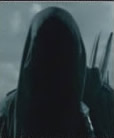The author’s theory on the origin of the word hobbit, for example, is as learned as it is free of academic jargon. Even his analyses of the abstruse Silmarillion, Tolkien’s equivalent of Joyce’s Finnegans Wake, avoid getting too technical. In addition, Shippey shows that Tolkien as a storyteller often improved on his ancient sources, while The Lord of the Rings is unmistakably a work of its time. (The Shire chapters, like Orwell’s 1984, evoke the bleakness of late-’40s Britain.) In treating such topics as the nature of evil, religion, allegory, style and genre, the author nimbly answers the objections of Tolkien’s more rabid critics. By the end, he has convincingly demonstrated why the much imitated Tolkien remains inimitable and continues to appeal.

~Nazgul~
"Give up the halfling, she-elf!"
UserOnline
Users Online: 79 Guests
Messages
Login to view your messagesRegister
Would you like to become a site member? You can register or login here.









